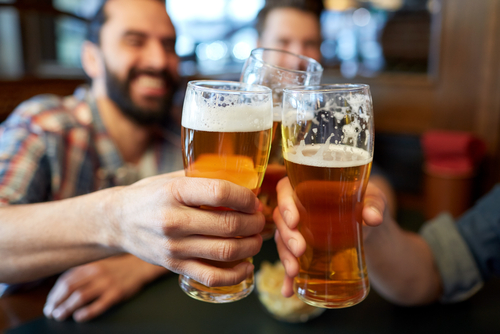
This article was originally published on February 6, 2020.
If you’re anything like me, you’ve often wondered: How bad are a few beers really for me?
I mean, archaeologists have proof that humans have been drinking for over 9,000 years—perhaps even earlier—and there has been some form of alcohol use in almost every society throughout history. For most of these millennia, there was no reason to feel guilty about imbibing, as long as you did it in moderation and responsibly. It’s like in the Bible.
Fast forward a few thousand years and some studies show that alcohol can be beneficial for heart health. For longevity. You may have heard that a glass of wine a day can keep the doctor away. And yes, in case you’re wondering, there are actual, legitimate studies linking things like resveratrol and antioxidants in red wine for good health.
Watch it here:
So you don’t mind if I do…
Wait! But hold on. In 2018, a group of scientists reviewed 700 different studies on alcohol and health from all over the world and said, hey, actually no alcohol consumption is healthy. ike
A big reason for this is that there is a growing body of evidence that shows alcohol is linked to cancer. And this evidence seems to go beyond all of these potential heart health benefits. who who.
Alcohol and Health: The Effects of Drinking Alcohol
Alcohol is classified as a group 1 carcinogen. This is the same classification given to tobacco and radiation from the sun. This does not mean that drinking is as bad for you as smoking. This “Group 1” thing just refers to how strong the evidence is that exposure can cause cancer. As if not every smoker will get cancer, but researchers are really sure that this connection is there.
So it turns out that drinking alcohol is the third best way to give yourself fatal cancer, right after smoking cigarettes and being overweight. In more technical terms, alcohol use is third on the list of avoidable risk factors associated with deadly cancers in the United States. About 3.5 percent of all cancer deaths in a given year are alcohol-related.
Now, 3.5 percent doesn’t sound like much when you compare it to the 30 percent of cancer deaths that are from cigarettes — but that 3.5 percent still comes out to about 19,500 deaths each year. Obviously, cancer kills a lot of people.
If those numbers don’t do anything for you, we can also think about alcohol in terms of cigarette units. Drinking one bottle of wine has the same carcinogenic impact as smoking five cigarettes for men and 10 cigarettes for women.
I don’t know about you, but I haven’t smoked 10 cigarettes in my life. But the last time I drank a bottle of wine was yesterday.
By the way, in case you’re wondering, these gender differences aren’t due to tolerance or body size. This is because women have more breasts. So if a person with a large bust drinks 10 drinks a week – which is considered moderate drinking – the risk of breast cancer increases specifically for them. More than other types of cancer.
But even those without breasts should watch how much they drink. If 1,000 men and 1,000 women drank one bottle of wine each week, about 10 of those men and 14 of the women would develop cancer as a result. And there are a bunch of different cancers that are linked to alcohol. Breast, colon, rectum, liver, oral cavity, esophagus – did I forget any?
Blame your liver for drinking carcinogens
And the reason for this is not the alcohol itself. This is because when your body processes alcohol, it turns it into a compound called acetaldehyde. Which is highly toxic and a known carcinogen. Thanks a lot, liver.
Acetaldehyde can permanently damage the DNA in your blood stem cells. And if the right gene goes wrong, those cells can start reproducing like crazy; spreading, one might say, like a cancer.
I mean, it’s cancer. I am literally telling you how cancer works.
But this DNA damage isn’t the only way alcohol can cause cancer. For one thing, drinking can increase estrogen, a hormone linked to breast cancer.
But all that being said, the effects of drinking alcohol are not the same for everyone. Some drinkers will never develop cancer; some light drinkers may. This difference probably has to do with our genes, which determine how our bodies break down alcohol.
How much alcohol is safe to drink?
But if all this research is news to you, you’re not alone. Sixty percent of Americans say they don’t know about alcohol’s cancer risk. But awareness of the risk of cancer or other effects of alcohol may not actually change one’s behavior. Studies say—and this is especially true for women—that negative effects on weight and relationships are more likely to cause a person to abstain.
But I don’t want to be a total jerk. So if you’re not quite ready to go sober, here’s one last treat for you.
Researchers recently reviewed the health records of more than 400,000 people, focusing on how light and moderate drinking affects mortality. They found that there is a safe amount of alcohol to drink per week, at least for most people. You might want to write this down. Are you ready?
If you’re having one or two drinks a few times a week, it’s still not good for you, but it’s probably not that bad.
Remember, the next time you want to relax with some wine or cheer yourself up with some beer, moderation is key. Don’t let that acetaldehyde ruin your next party.
Anna Funk is an associate editor for Find out. Follow her on Twitter @DrAnnaFunk and check out ours YouTube channel for more videos.
This video is based on a report from Find out staff writer Megan Schmidt: “Can a beer a day increase the risk of cancer?“

